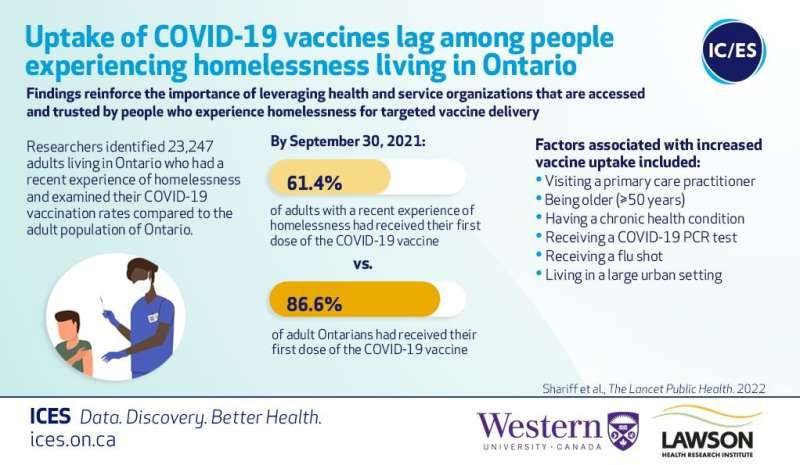Pioneering research bridges engineering and medicine

By the end of September 2021, uptake of COVID-19 vaccines among adults with a recent experience of housing insecurity were 25 percent lower than the adult population of Ontario for a first dose, and 34 percent lower for a second dose, according to a new study.
Published in The Lancet Public Health, the study is the first in Canada to examine vaccination rates among persons experiencing homelessness.
Using provincial data from ICES Western, researchers followed 23,247 adults with a recent experience of homelessness from December 14, 2020, to September 30, 2021, and examined vaccination rates for a first and second dose of a COVID-19 vaccine, which they compared to the adult population of Ontario.
"What is particularly striking about our study findings is that despite being prioritized for early vaccination receipt and the considerable efforts by shelters, public health organizations, health care institutions, and various community organizations to make vaccines available to people experiencing homelessness in Ontario, vaccination rates for a first dose have substantially lagged behind the rest of Ontario," said Arthur Labatt Family School of Nursing professor Salimah Shariff, also an associate scientist at Lawson Health Research Institute, and scientist at ICES Western.
The study identified the following vaccination rates by the end of September 2021:
First dose: 61.4 percent in adults with a recent experience of homelessness versus 86.6 percent in the total adult population of Ontario
Second dose: 47.7 percent in adults with a recent experience of homelessness versus 81.6 percent in the total adult population of Ontario
To assist with tailored public health communication and vaccine delivery efforts, researchers also examined factors that may have influenced uptake of a first dose of a COVID-19 vaccine among persons with a recent experience of homelessness. Findings revealed that individuals who had more contact with the health-care system, particularly with primary care, had higher rates of vaccine uptake.
Factors also found to be associated with higher uptake include:
- being older (50 years old and above)
- having a chronic health condition
- receiving a COVID-19 PCR test
- receiving a flu shot
- living in a large urban setting
"These findings suggest that connection and access to primary health care is a vital factor in facilitating the uptake of COVID-19 vaccination among persons experiencing homelessness. From the very beginning, vaccination approaches in this population have outlined that trust and relationship building would be central to a successful vaccination strategy," said Arthur Labatt Family School of Nursing professor Richard Booth, also an associate scientist at Lawson, and scientist at ICES Western.
"Concerted and informed efforts to enhance vaccination rates, such as integration of family medical practices and community health centers in vaccination efforts, may help in increasing vaccination rates in this population," said Booth.
People experiencing homelessness have been disproportionately impacted by the COVID-19 pandemic. Previous research by this team revealed that during the first wave of the COVID-19 pandemic in Ontario, people experiencing homelessness were more likely to test positive, be hospitalized, receive intensive care for, and die of COVID-19, compared to the general population.
"With emerging COVID-19 variants and strains, public health guidance now recommends that everyone who is eligible should receive a third dose of a COVID-19 vaccine for added protection; however, our research brings to light that many people experiencing homelessness have yet to receive a first dose of the vaccine. There is therefore an urgent need to increase vaccination efforts in this historically marginalized population," said Shariff.
The findings reinforce recommendations from experts on leveraging existing health and service organizations that are accessed and trusted by people who experience homelessness for targeted and tailored vaccine delivery, the researchers added.
More information: Salimah Z Shariff et al, COVID-19 vaccine coverage and factors associated with vaccine uptake among 23 247 adults with a recent history of homelessness in Ontario, Canada: a population-based cohort study, The Lancet Public Health (2022). DOI: 10.1016/S2468-2667(22)00037-8




















